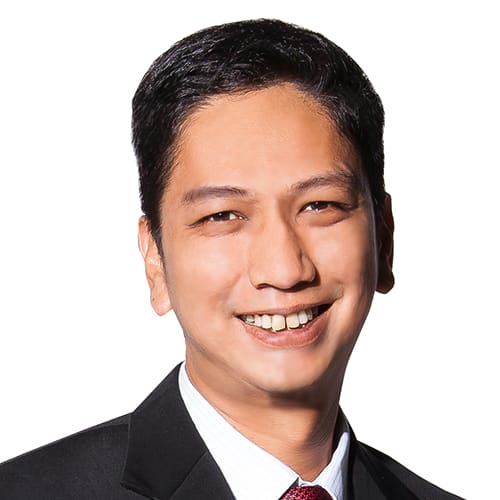Cafe run by deaf people in Indonesia strives to overcome discrimination, one cup at a time
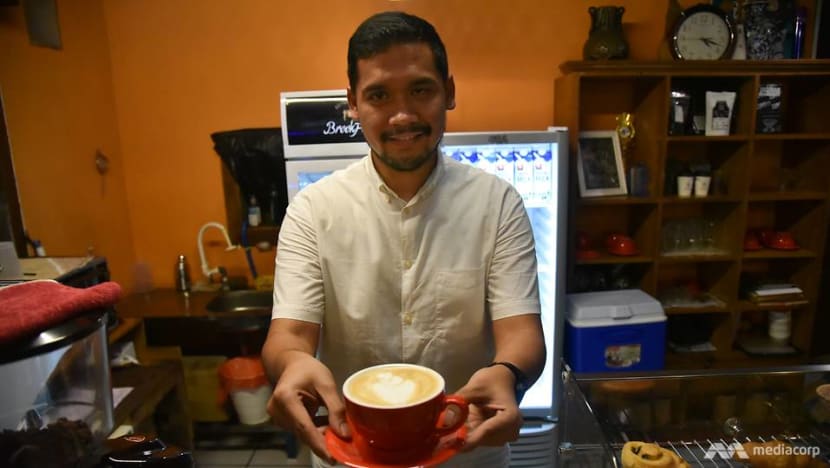
Mr Adhika Prakoso, 29, co-founded Kopi Tuli, a cafe that exclusively employs deaf people. (Photo: Nivell Rayda)
JAKARTA: After applying to more than 200 companies and getting rejected by all, a restless Adhika Prakoso texted his childhood friend Putri Santoso early last year.
“Have you found any job?” asked Mr Prakoso, who graduated with a diploma in visual arts in 2016.
Ms Santoso replied in the negative, adding that she had sent her resume to more than 500 companies.
“What do you think if we start our own business together?” Mr Prakoso said.
Ms Santoso jumped at the proposition and suggested that they rope in a common friend, Mr Tri Erwinsyah Putra, who was facing the same dilemma.
That evening, the three friends - who lost their hearing as toddlers and knew each other since kindergarten - met up at a shopping mall to brainstorm business ideas.
“We settled on opening a cafe. Not just any cafe, but one that exclusively employs deaf people," Mr Prakoso, 29, recounted to CNA through a sign language interpreter.
“We decided to call it ‘Kopi Tuli’ (Deaf Cafe), because that would be our identity. That would be what sets us apart."
The Indonesian Law on Disabilities, passed in 2016, bars discrimination in the hiring process and mandates businesses to allocate 1 per cent of their workforce to people with disabilities.
But having been told a few times he would not be a good fit in the workplace due to his inability to engage in “good and fast communication", Mr Prakoso wondered how much of that quota went to the hearing impaired.
“It seems like the deaf is the last group of people companies would hire,” he bemoaned.
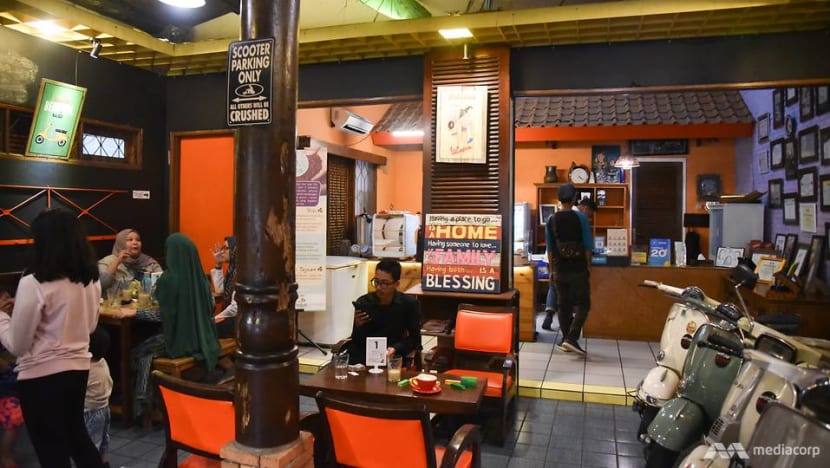
Given their past experiences and struggles, the trio positioned Kopi Tuli as a bridge between the deaf and the hearing.
It would be a place to promote sign language and to empower deaf people, so they can be economically independent.
READ: 'No different from other teachers' - The childcare aide with special needs
STEEP LEARNING CURVE
The three were fortunate to have supportive families who liked the idea and agreed to finance their business venture.
Mr Prakoso's uncle, a classic scooter fanatic, even offered his defunct scooter-themed restaurant in Krukut, just south of Jakarta, for them to convert into a cafe.
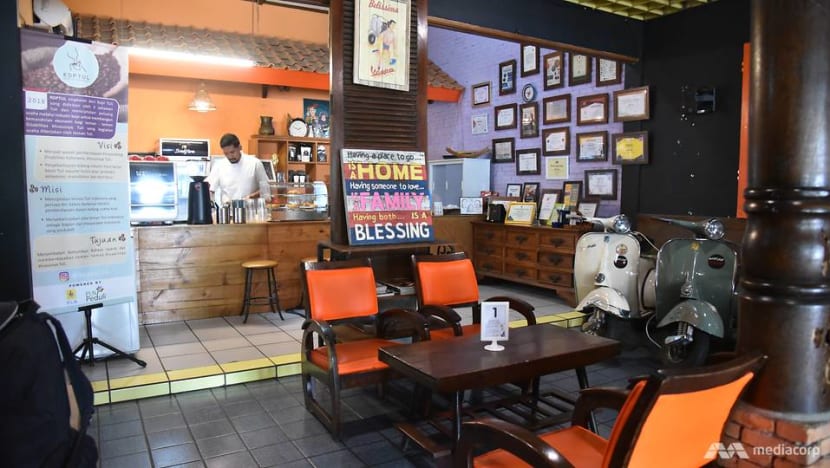
But there was just one problem: none of them knew how to brew a good cup of coffee.
They spent the following weeks learning how to become a barista, attending classes at various coffee roasters and cafes in Jakarta and even as far as Bandung, some 150km away from the Indonesian capital.
“It takes longer for a deaf person to learn new skills,” Mr Putra explained.
For start, they could can only read their instructors’ lips, which was a problem if the instructors were talking too fast, standing far away on a stage or simply not facing the students.
“We had to go up to the instructors and explained to them that we are deaf and asked them to repeat what they said slowly,” he said.
Even then, miscommunication was abound.
“For example, the word ‘mama’ and ‘papa’ look the same to a lip-reading deaf. So don’t be surprised if we keep asking the same question over and over again,” Mr Putra said.
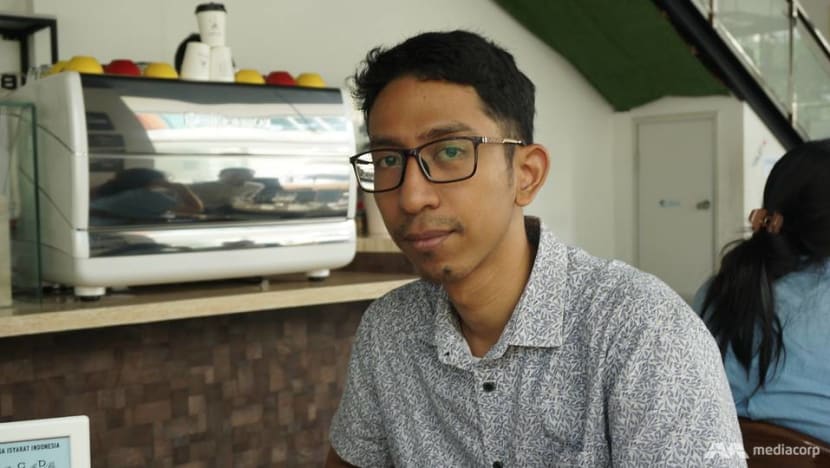
READ: Almost 3 in 10 people with disabilities who are of working age are employed: MOM survey
Another problem arose when the instructors demonstrated a technique while speaking at the same time, dividing the deaf people’s attention.
Similarly challenging was the fact that they could not communicate if their hands were doing something else.
Also, they could not hear the sound their machine made, and had to touch and feel it to know if it was doing its intended tasks.
“There were many challenges, but we never let that stopped us,” he said.
BRIDGE BETWEEN THE DEAF AND THE HEARING
Kopi Tuli opened its doors on May 12 last year, retaining the same vintage scooter theme as Mr Prakoso’s uncle’s restaurant.
Its logo is the Indonesian sign language for "coffee".
It became an instant hit among the locals in the budding residential area, which has so far remained untouched by well-established cafes and restaurant chains.
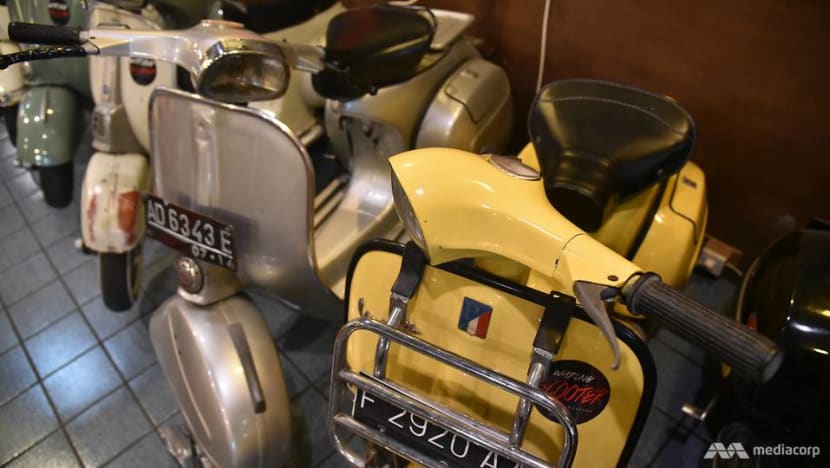
With beverages priced between between 19,000 and 21,000 rupiah (US$ 1.34 and US$ 1.48), Kopi Tuli is an attractive hangout spot for youths.
Here, no music is played in the background and no Wi-Fi is provided.
“We want to encourage people to chat and communicate, not staring at their phones. We also have board games for people to play, have fun and interact with each other,” Mr Prakoso said.
Local resident Ms Kristina Anastasia remembered feeling confused the first time she came to Kopi Tuli.
“Before my first visit, I had no idea that this cafe exclusively employs deaf people.
“I wasn't sure how to order but they walked me through it, showing me that all I had to do was just pointing at the menu. The people here are very nice. They even teach me basic sign language, like how to say ‘thank you,’” she said.
READ: International coffee chains and local brands thrive on Indonesia’s Bali island
Mr Putra, who studied graphic design, designed the menu to guide both the hearing and the deaf to place their orders.
Each of the 12 items on the menu is assigned a letter in the alphabet, with an accompanying picture showing customers how to sign the letter.
“We don’t have a specific sign language for ‘cappuccino’ or ‘americano’, so customers can order by signing the corresponding letters,” he said.
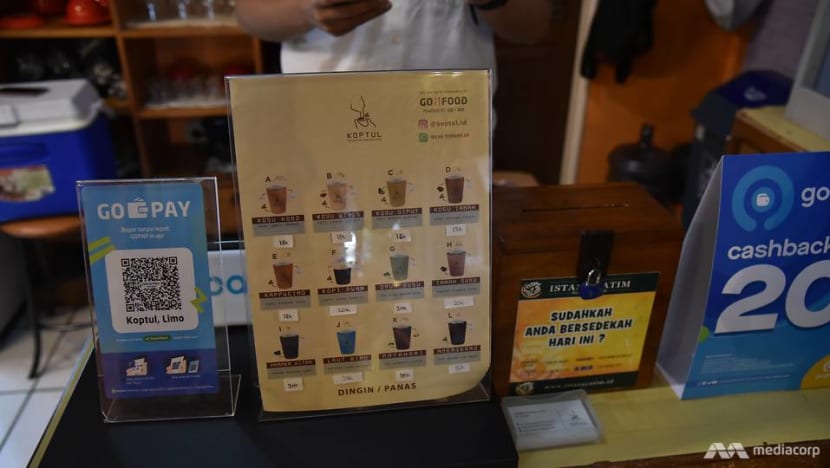
Kopi Tuli was so successful that the three co-founders opened a second outlet just months later in October in a new office and commercial complex at Duren Tiga, South Jakarta.
Sign language classes are held here every other evening.
WORKING TO END DISCRIMINATION
Ever since opening Kopi Tuli, the three co-founders have been invited to speak at universities and corporate events to share their story.
“We use every opportunity we get to shed light on the discrimination we are facing. The deaf can do any kind of work, including in the formal sector,” Mr Prakoso said.
“We can do anything as long as companies are willing to give us the opportunity. Companies need to realise that we simply communicate differently from others and all it takes to overcome that is a short training for the hearing people on how to communicate with their deaf colleagues.”
Mr Putra concurred.
“Before I graduated, I used to intern at an advertising company. I got my job done just like other workers there. Communication was a challenge at first but we overcame that hurdle pretty fast,” he recounted.

Ms Asri Alyani, 23, who works at Kopi Tuli, said even when companies do hire people with disabilities, they often do not get the same opportunities as their able-bodied peers.
In her previous job at a supermarket, she was only assigned to do menial work - checking the inventory or doing basic accounting - which did not require her to communicate with other workers or customers.
“They gave me a one-year contract, not a full-time employment like other applicants. Once my contract ended, I was unemployed once more,” she said.
Ms Alyani said many of her disabled friends are currently unemployed. Those who have jobs, meanwhile, mostly work informally as mechanics or janitors.
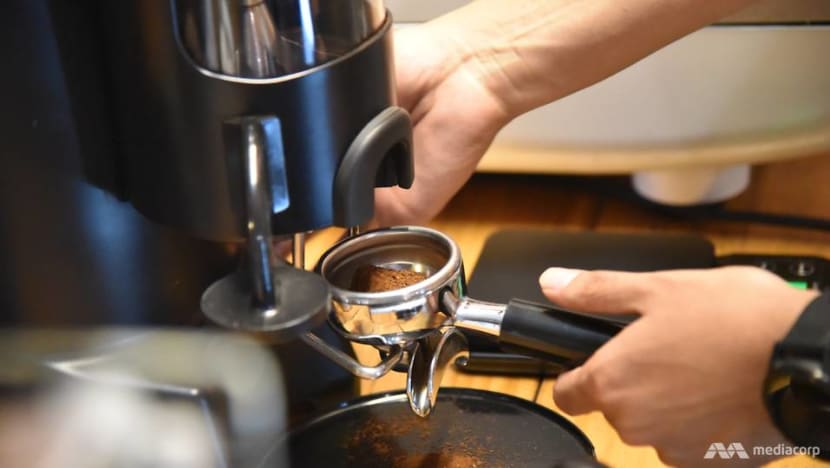
According to the Ministry of Manpower, out of 136 million working age population in Indonesia, 21.9 million have some form of disabilities but only 10.8 million are employed.
The ministry said it will continue to push companies to live up to the 1 per cent employment for people with disability quota, as mandated by the law.
However, Mdm Maulani Rotinsulu, chairman of the Indonesian Association of Women with Disabilities, found the ministry's data questionable.
“The figure does not distinguish between people with disability who work in the formal sector and those who work in the informal sector,” the activist told CNA.
“I believe the number of people with disability who are formally employed as a full time worker are less than 1 million.”
READ: 'I just see myself like anybody else': 22-year-old Vanessa Chea says her hearing loss doesn't make her different
LONG ROAD AHEAD
While noting that companies are starting to change since the introduction of the 2016 law, Mdm Rotinsulu said changes are still too slow.
“The law does not specify what type of punishment companies would get if they fail to comply,” she said.
She also suspected that the formally employed ones only have mild forms of handicap, instead of those who are wheelchair-bound or have completely lost their eyesight or hearing.
“Companies still see hiring people with disabilities as a burden. But if they have money to build lavish offices, they should be able to build ramps for people in wheelchairs.
“If they can equip their workers with the necessary computer software, then what is the problem of providing another software to help visually impaired workers?” she said.
As for communication with the deaf, companies can utilise emails, messaging platforms and apps, she added.
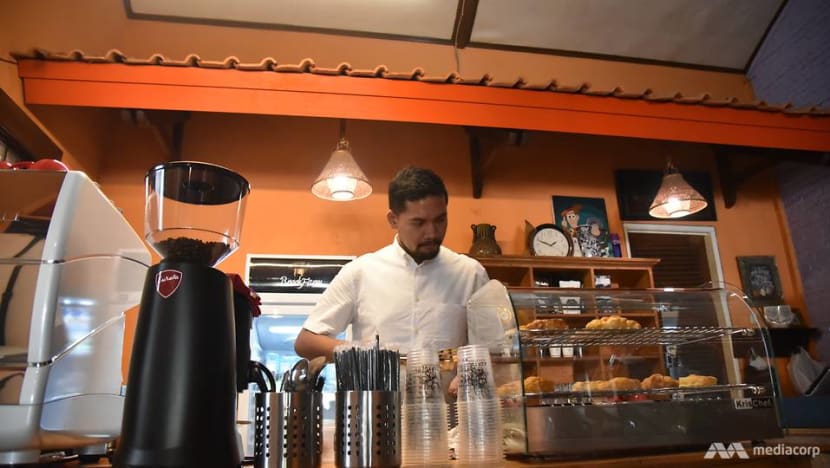
Kopi Tuli now offers employment to six deaf people.
“Many of our deaf friends applied, begging us to hire them. I wish we could hire all of them but we can’t,” Mr Putra said.
“I hope our venture opens people’s eyes and will encourage companies to start hiring people with disabilities. I also hope we will inspire other people with disabilities to start their own businesses and empower others.”








